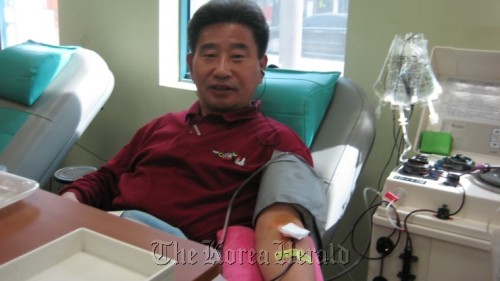Sohn Hong-shik on way to become the first Korean to donate blood 600 times
Retiree Sohn Hong-shik has a long-cherished habit that he says freshens him up like having a haircut or taking a bath, but may sound freakish to others: having a needle stuck in his arm and blood pumped out of it.
For Sohn, 61, blood donation has been an almost once-every-two-weeks ritual for the past 27 years. He has donated more blood than anybody else in South Korea ever, earning himself the nickname “king of blood donation.”
Sohn has so far offered about 250,000 cc of blood in 597 donations since 1984 when he was 34. It amounts to the total blood of about 60 average adult men.
In a couple of months, Sohn will be the first South Korean to donate blood 600 times, a feat that comes at a time when Koreans are growing increasingly willing to donate blood, with the number of donations last year reaching the highest level ever.
“When I first started this, I just wanted to test my willpower because up until then, I had only thought about it without putting it into action. Like everyone else, I was also scared of needles,”
Sohn said in a phone interview from his home in the southern city of Gwangju.
 |
Sohn Hong-shik donates blood at Chonnam National University Hospital on March 18. (Sohn Hong-shik) |
“After some 10 times, however, my body got used to it as if it’s a habit,” he said.
In the early years, Sohn donated blood only once every two months, the shortest interval required between donations under law at the time in consideration of a donor’s health.
But advances in medical technology made it possible to draw only key elements of blood, such as platelet and plasma, from donors while putting much less stress on their bodies. Unlike whole blood donations, only two weeks is required between platelet or plasma donations.
“The more I donated blood, the more I felt it’s like opening a window to let bad air out, having a haircut or taking a bath,” Sohn said. “It’s like getting the vigor in my body to circulate.”
A former branch head of the government statistical agency, Sohn is the top honoree in the online “Hall of Fame” set up and run by the Korea Red Cross Blood Services, a state agency in charge of blood collection and distribution in Korea since 1958.
Those who donated blood at least 100 times merit a spot in the Hall of Fame.
As of last year, a total of 3,622 people were listed there, 3,326 of them with donations of more than 100 times, 252 people with more than 200 times, and 44 with more than 300 times. They receive no special benefits, except for small souvenir-like gifts from the blood agency.
“They say they just wanted to help other people,” said Park Kyung-eup, an official at the blood agency. “Among the 300-donation honorees is a handicapped person, and he said that blood donation was the only thing he could do for other people because of his physical challenges.”
Park said that the number of blood donations in Korea has been on the steady rise in recent years, posting an all-time high of about 2.7 million last year, about 5.5 percent of the country’s 50 million population.
A 5 percent in the donation-population ratio is considered the level of advanced nations.
Last year’s record represents a significant stride for a nation where it had been allowed to sell blood for money to make up for the shortfall in donations before the practice was banned in 1974.
Sohn said that blood donation is a privilege and obligation of healthy people.
“Food has substitutes. Rice can be substituted by noodles or bread. But there is no substitute for blood,” he said. “What has increasingly come to my mind while the number of my donations rose was that this is something that healthy people should do.”
Under South Korean law, Sohn is allowed to continue donations until he reaches 70 because he has a record of donating blood after he turned 60. If one does not donate blood between the time they are 60 and 65, the age limit is 65.
As anyone may guess, Sohn intends to continue the habit as long as his health allows.
“I now take even the pricking pain of a needle as evidence that I am alive, healthy,” he said. (Yonhap News)








